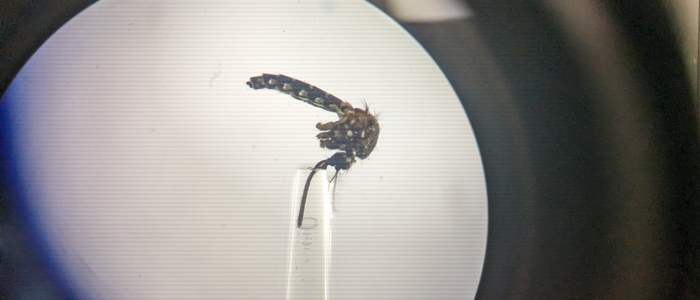Understanding Mosquito Saliva: Wolbachia's Impact on Virus Transmission
Published: 16 May 2024
Daniella Lefteri's has recently been awarded a Wellcome Early-Career Fellowship to conduct research aiming to understand how the insect bacteria Wolbachia affects mosquito salivary glands and virus transmission.
The CVR is delighted to announce that Daniella Lefteri has been awarded a Wellcome Early-Career Fellowship. These fellowships are awarded to early career researchers who will develop their research identity by delivering innovative projects and progress towards leading their own independent research programme. Daniella will continue to work in Steven Sinkin’s lab and develop her research on Wolbachia and mosquito transmitted viruses.
Find out more about Daniella’s research:
What is the problem that your research will address?
Mosquito borne diseases are of a huge global medical concern. Dengue virus alone is known to infect more than 400 million people globally every year and it’s expected to increase due to climate change. Wolbachia is a natural insect bacteria which blocks transmission of the Dengue virus to humans. Whilst Wolbachia releases have proven to be of huge success in reducing the spread of Dengue virus, there is still a lot we do not understand within this research field. Transmission of mosquito borne diseases is a complex process encompassing a mix of virus-vector-host interactions, with mosquito saliva playing a crucial part by enhancing virus infection in the mammalian skin via vasodilation and an influx of immune cells. My research aims to investigate the interactions between the endosymbiont Wolbachia and the mosquito, understanding the effect the presence of Wolbachia is having on mosquito salivary glands and the effect these changes have on onwards virus transmission.

What methodologies will you use?
This work will initially be done using proteomic analysis on salivary glands of Wolbachia carrying Aedes aegypti mosquito lines to investigate effect of Wolbachia on salivary glands. This means that each protein in the glands will be identified and quantified. Key targets of interest will be identified and used to create CRISPR-cas9 knock-out mosquito lines. The effect that these specific proteins have on virus infection and immune responses in mammals will then be assessed in mice. The CVR strictly adhere to the principles of the 3Rs (replacement, refinement and reduction) to ensure that the highest ethical standards are maintained when small animal models are involved in research.
What are you hoping to achieve?
With this research I am hoping to add to our understanding of how mosquito saliva manipulates the immune responses in the skin and how this aids mosquito borne virus infections. More specifically I am hoping to identify ways to optimise Wolbachia releases and also identify specific salivary components that can be targeted for future virus control strategy developments.
How are you feeling about this announcement?
I am very thrilled to be given this opportunity to carry out this research and to develop my own research niche! I look forward to the exciting science to come!
First published: 16 May 2024
<< News


